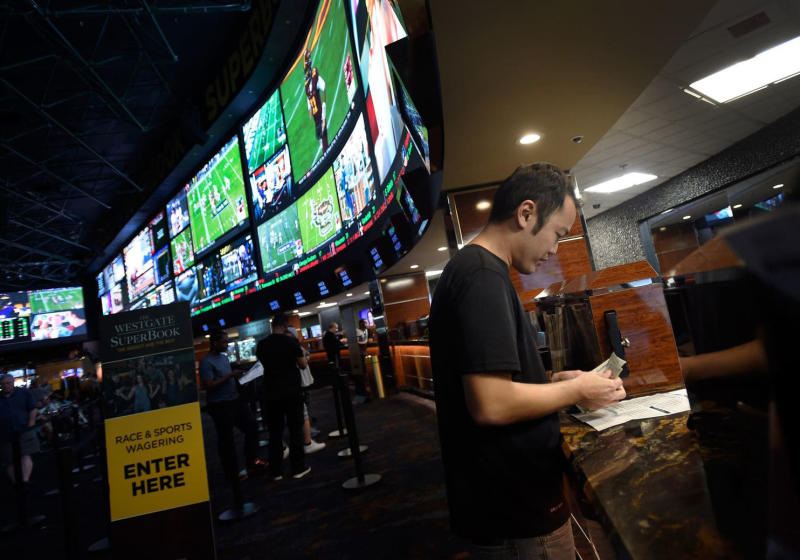Sports betting: The race is on for slice of lucrative US gambling pie
Sign up now: Get the biggest sports news in your inbox

The US Supreme Court's lifting of a ban on sports gambling has sparked a race to cash in on what is being seen as a multi-billion dollar opportunity.
PHOTO: THE WASHINGTON POST
Follow topic:
NEW YORK (AFP) - And they're off!
The United States Supreme Court's lifting of a ban on sports gambling has sparked a race to cash in on what is being seen as a multi-billion dollar opportunity.
US states and companies are jostling to be the first to allow punters to try their luck on everything from the Super Bowl to the "March Madness" college basketball tournament.
And it may not be a question of years or months but of days before they get their chance to lay down a bet.
Monmouth Park, a horse racing track in New Jersey, has partnered with British bookmaker William Hill and said it will begin taking sports bets at the track on May 28.
Within hours of the Supreme Court ruling, two leading fantasy sports companies - FanDuel and DraftKings - announced plans to branch out into sports wagering.
It was a lawsuit filed by New Jersey that led to the landmark US Supreme Court ruling on Monday that legalised sports gambling in states other than Nevada.
In a 6-3 ruling, the nation's top court declared unconstitutional a 1992 federal law which banned wagering on professional and university sports.
It is now up to individual states to pass legislation permitting betting on baseball, basketball, American football, ice hockey and other sports.
Betting on horse racing has been permitted in most US states but Nevada was essentially the only US state until now where gamblers could legally lay down money on other pastimes.
The Supreme Court left open the possibility for Congress to regulate sports gambling directly but experts said individual states are likely to move faster on the question than Washington.
"It's possible that members of Congress will try to introduce legislation to deal with the aftermath of this decision," said Michelle Minton, a senior fellow at the Competitive Enterprise Institute.
"I don't expect that they're going to get very far," Minton said, adding that she expects a "bunch of states" to legalise betting in the next few months.
"They're going to experiment," she said. "They're going to try different tax rates, different levels of product availability, online and offline.
"And over the years, they'll figure out what works best for them, what's the most profitable."
Minton noted that New Jersey, home to Atlantic City, the largest US gambling hub after Las Vegas, has been "thinking about this longer than I think any other state has except for maybe Nevada".
Jason Settlemoir, general manager of the Meadowlands Racetrack, located in New Jersey less than 15km from Manhattan, said he expects to offer sports betting ahead of the opening of the National Football League season on Sept 6.
The biggest questions facing each state is how they plan to tax the business and handle online wagers.
New Jersey, in a bid to protect its Atlantic City casinos and its horse racing tracks, looks set to impose a higher tax on online bets.
Jeremi Duru, an American University professor who specialises in sports and entertainment law, said regardless of what happens, he expects Nevada to remain a major player on the gambling scene.
"The atmosphere around sports betting and watching games in the casinos in Nevada is so deeply engrained that it will always have a deep chunk of the market," Duru said.
Duru and others played down fears that expanding sports betting could impact the integrity of professional sports, as argued by the leagues.
"There's already Nevada, there's offshore sports betting, there's illegal sports betting, all of which could in theory impact the integrity of the game," he said.
"So I do not think that additional states getting into the fray here would further create a threat for the integrity of the game," Duru said.
"I think if there's a threat it already exists."
While Major League Baseball expressed concern that the court ruling could have "profound effects" on the game, National Basketball Association commissioner Adam Silver had long been a supporter of legalising sports betting.
Mark Cuban, owner of the NBA's Dallas Mavericks, welcomed the Supreme Court move and said it puts the United States in line with more than 100 other countries where sports gambling is permitted.
"It doubled the value of professional sports franchises in a heartbeat, in a second," Cuban told ESPN. "It'll increase interest, it'll add to what happens in our arena and in stadiums.
"It will increase viewership."

